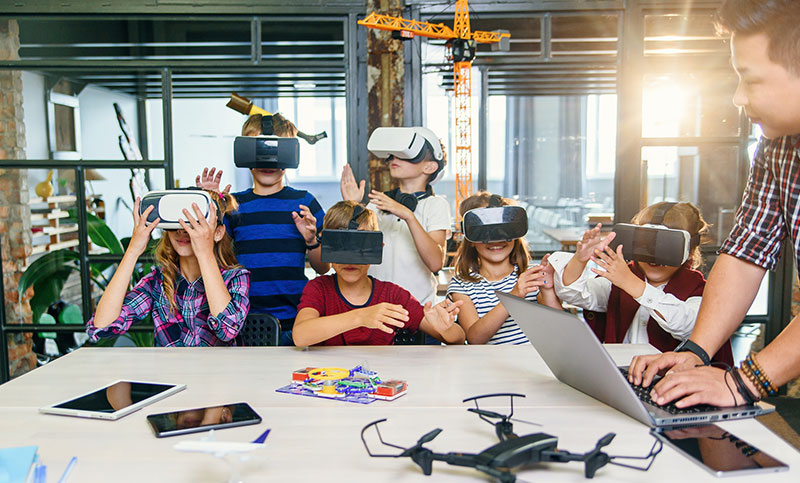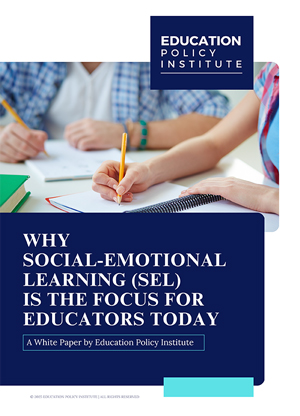The education landscape has evolved from the PC internet boom of the late 1990s, which introduced eLearning, to the era of mobile computing and social media that popularized microlearning through short, on-demand videos. Today, we are on the cusp of the metaverse era, where 3D digital spaces and lifelike avatars offer immersive, continuous interactions. This new digital realm holds significant potential for revolutionizing how we teach and learn.
The pandemic has accelerated the adoption of eLearning, highlighting the importance of engaging learning experiences. The metaverse enhances this by offering virtual classes that mimic real classroom interactions, breaking down physical barriers and creating immersive, interactive learning environments. This technology not only transforms traditional education but also opens new possibilities for hands-on, spatial training, making education more engaging, efficient, and accessible.
Introduction to the Metaverse
The metaverse is a transformative concept that combines "metaphor" and "universe," representing a three-dimensional virtual world where users can explore and interact in immersive ways. This digital realm has gained significant traction with the advent of virtual reality (VR) technologies, offering a vast array of virtual spaces that mirror real-world locations or create entirely new, imaginative environments.
In education, it allows students to engage in online courses from any location, providing the benefits of a traditional classroom without the need for physical proximity. Academic institutions and IT firms are actively working to enhance these virtual environments, making them more interactive, immersive, and conversational. This evolution reduces dependence on physical spaces, enabling richer, more engaging educational experiences.
Access to the metaverse can be achieved through internet browsers or specialized applications. These platforms host diverse experiences, from social interactions and shopping to gaming and learning, illustrating the metaverse's potential to revolutionize how we connect, shop, play, and educate.
The Impact of the Metaverse on Education
The emergence of this technology presents transformative opportunities for the educational landscape, fostering new methods of teaching and learning.
-
Immersive Virtual Campuses
The metaverse enables the creation of virtual campuses where students can engage in learning activities, explore different learning pods, and socialize with peers. These virtual campuses democratize education by connecting learners from various geographic and economic backgrounds, providing a cost-effective and flexible learning environment. -
Enhanced Real-World Skills
It offers experiential learning through realistic simulations, allowing learners to practice and hone their skills in a safe environment. This approach combines VR with data science and spatial design to boost engagement and confidence. Examples include VR training for lab skills, customer service, and handling workplace stress. -
Visualization and Storytelling
Through VR technology, the metaverse allows learners to immerse themselves in different worlds or perspectives, enhancing their understanding through visualization and storytelling. This method can make complex topics more accessible and engaging, such as exploring smart cities, climate change scenarios, or global development challenges. -
Development of Soft Skills
Training for soft skills, such as communication, leadership, and empathy, is greatly enhanced in the metaverse. Learners can practice these skills in simulated real-world conflicts and sensitive situations, preparing them for real-life interactions. -
Accessibility and Inclusion
This digital environment improves accessibility for individuals with disabilities, providing a safe space for practicing social and job skills. VR applications can help young adults with special needs improve their interpersonal skills and mobility, offering experiences like shopping or participating in community activities. -
Data-Driven Learning Insights
Intensively interactive learning allows for extensive data collection on learner performance, which can be used to track progress, identify gaps, and continuously improve educational experiences. -
Future Potential and Inclusion
Fosters diversity, equity, and inclusion in education by offering individualized learning opportunities and reducing the burden on educators. It also makes learning more engaging for digital-native students through the incorporation of gaming elements.
Benefits of Metaverse in Education
The metaverse is revolutionizing education, offering interactive learning experiences that surpass traditional methods in engagement and effectiveness.
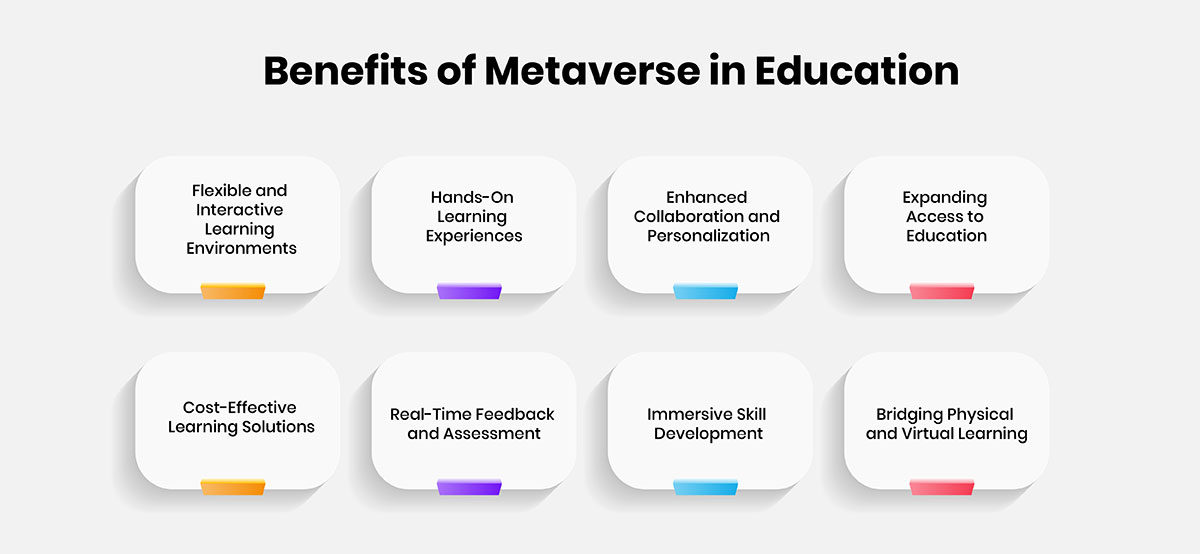
-
Flexible and Interactive Learning Environments
The virtual world is revolutionizing education by offering flexible and immersive 3D virtual environments. This technology enhances online courses with interactive elements akin to a traditional classroom, creating engaging and effective teaching experiences. -
Hands-On Learning Experiences
Metaverse tools like VR and AR enable students to interact with complex concepts in a tangible way. For instance, students can virtually explore the solar system or simulate rocket launches, making learning more intuitive and enjoyable while improving information retention. -
Enhanced Collaboration and Personalization
It promotes collaborative learning by allowing students to interact in realistic virtual settings. Educators can use avatars and role-playing to simplify complex subjects and create personalized learning paths. Virtual field trips and simulations provide a richer educational experience beyond physical constraints. -
Expanding Access to Education
By eliminating geographical barriers, this digital landscape makes education accessible to students worldwide. This virtual platform allows learners from remote or underserved areas to participate in classes and interact with educators and peers, bridging socio-economic gaps. -
Cost-Effective Learning Solutions
Virtual environments in the metaverse reduce costs by reusing digital resources and eliminating physical materials. This efficiency allows institutions to offer a wider range of programs and services, making education more affordable and scalable. -
Real-Time Feedback and Assessment
This digital realm provides tools for real-time feedback and assessment, enabling educators to monitor student progress and offer immediate insights. This capability facilitates timely interventions, enhancing learning outcomes and addressing challenges as they occur. -
Skill Development
The virtual universe excels in skill-based training by offering interactive simulations for complex or risky tasks. Students can practice surgeries or experiment with prototypes in a safe virtual environment, building practical experience and confidence before applying their skills in the real world. -
Bridging Physical and Virtual Learning
Overall, the metaverse integrates physical and virtual learning, offering customizable and engaging instructional experiences. As it evolves, the promises to further enhance teaching and learning, providing innovative solutions for modern education.
Challenges of Metaverse in Education
As this new virtual era brings new possibilities, several challenges must be addressed for its effective use in education.
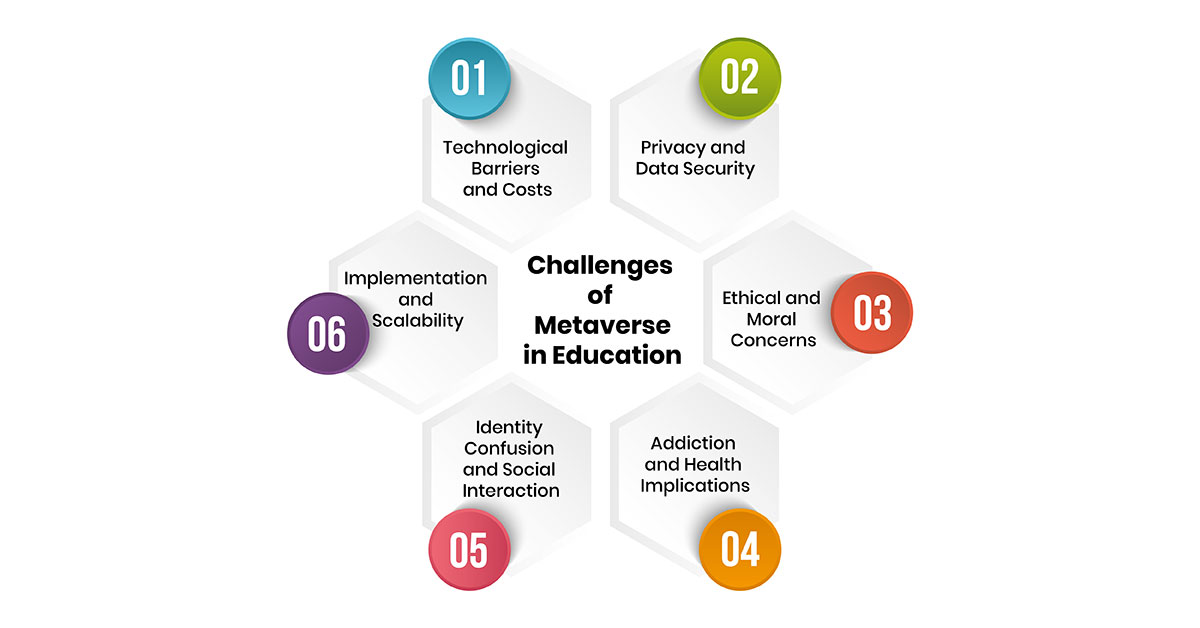
-
1. Technological Barriers and Costs
Advanced VR headsets and smart wearables required for the metaverse are costly and not widely accessible. Current technology often falls short of the standards needed for broad implementation, potentially limiting its adoption to well-funded institutions. -
2. Privacy and Data Security
Protecting personal data in the digital landscape is critical. The platform collects extensive information, raising concerns about privacy and security. Increased online anonymity also heightens the risk of inappropriate content and cybercrime. -
3. Ethical and Moral Concerns
The metaverse’s global reach brings complex ethical issues, including cyberbullying and data theft. Navigating these challenges requires clear guidelines and ethical training to ensure a respectful virtual environment. -
4. Addiction and Health Implications
The intensely engaging characteristic of the metaverse can lead to excessive use, potentially affecting physical and mental health. Managing time and balancing virtual and real-world activities is essential to prevent addiction. -
5. Identity Confusion and Social Interaction
Blurring lines between virtual and real identities may impact students' social interactions and relationships. Additionally, the role of human educators might be challenged by virtual avatars and AI-powered Non-Player Characters (NPCs). -
6. Implementation and Scalability
Integrating this virtual reality into schools involves significant investment in technology and training. Ensuring equal access and addressing logistical constraints are crucial for widespread adoption.
Metaverse Applications in Learning
Educational technology is being reshaped, providing innovative solutions that enhance learning and expand opportunities for students and educators.
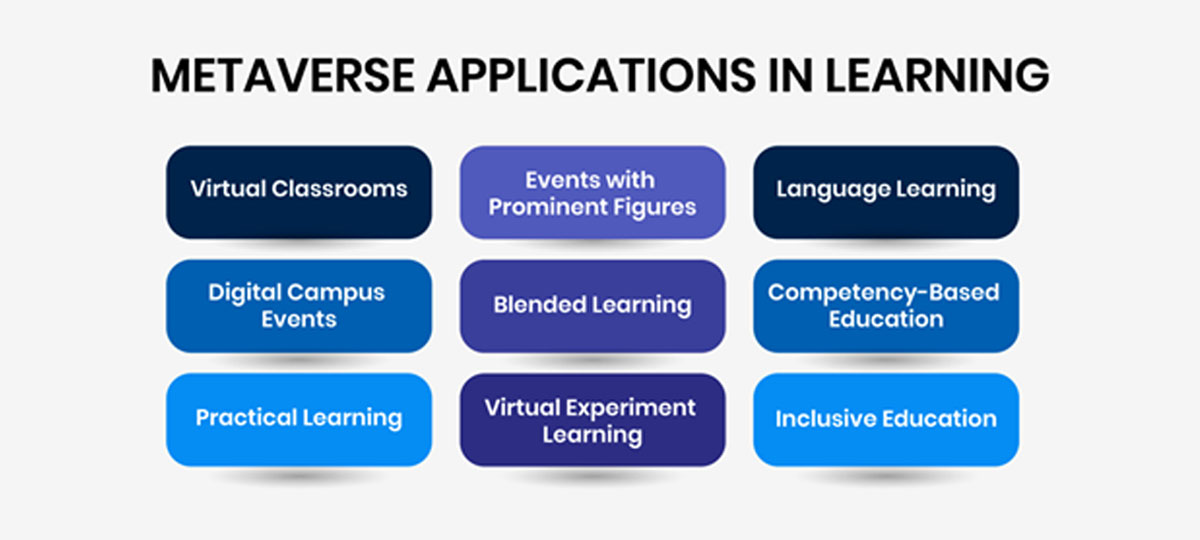
-
Virtual Classrooms
This cyber space facilitates deeply engaging 3D virtual classrooms where students and educators interact through avatars, explore virtual libraries, and engage in dynamic activities. This technology overcomes physical and time constraints, offering a more captivating educational atmosphere. -
Digital Campus Events
Students can participate in extracurriculars such as sports, clubs, and arts within a virtual setting, replicating traditional campus experiences. This allows for involvement in activities and events without geographic limitations. -
Practical Learning
Virtual environments facilitate applied learning by integrating concepts across disciplines. Students can interact with complex ideas, gaining a deeper understanding through practical, engaging experiences. -
Events with Prominent Figures
This digital landscape hosts virtual events with notable experts, such as scientists and athletes. Students can attend lectures, seminars, and discussions, accessing valuable insights from leaders in various fields. -
Blended Learning
Integrating virtual and in-person learning, flexible educational models are supported. Students engage in real-time and asynchronous activities, interacting with instructors and peers through avatars in diverse scenarios. -
Virtual Experiment Learning
Virtual laboratories allow students to conduct experiments and simulations, offering hands-on experience in a controlled setting. This technology complements theoretical knowledge with practical application. -
Language Learning
The metaverse enhances language learning by simulating real-world environments where students practice speaking and listening skills with avatars in interactive scenarios. -
Competency-Based Education
It supports competency-based education by providing environments for theoretical learning and practical skill development. Students gain broad and specialized knowledge through seamless transitions between classroom and real-world settings. -
Inclusive Education
Virtual spaces support inclusive education by allowing students with special needs to learn alongside their peers, facilitating integration and ensuring access to quality education.
Preparing Educators to Teach in the Metaverse
As the cyberworld becomes integral to education, educators must evolve to meet its demands.
-
Technological Proficiency
Teachers need hands-on training with VR, AR, and MR tools, becoming comfortable with setting up virtual classrooms and troubleshooting issues. -
Pedagogical Adaptation
Educators must rethink traditional methods, incorporating virtual simulations, 3D models, and interactive storytelling. Emphasizing collaborative learning through virtual group projects and peer interactions is key. -
Continuous Professional Development
Regular training, webinars, and courses on metaverse advancements are essential. Professional learning communities help educators share best practices and innovate. -
Ethical and Inclusive Teaching
Training should address digital citizenship, data privacy, and creating accessible virtual environments to ensure inclusivity.
Conclusion
The metaverse is poised to revolutionize education by creating immersive, flexible, and interactive learning environments. It breaks down physical and socio-economic barriers, making education more accessible and inclusive. As we navigate the challenges of technology, privacy, and ethics, the potential benefits of the metaverse in education are vast. By preparing educators and leveraging innovative tools, we can transform traditional learning into a dynamic, engaging experience that equips students with the skills and knowledge they need for the future. The integration of the metaverse into education is not just an enhancement; it's a fundamental shift in how we perceive and deliver learning, paving the way for a more connected and enriched educational landscape.
Latest
Trends blogs
- From Vision to Impact: Closing the Gender Gap in STEM Education
- Automation, Artificial Intelligence, and the Future of Human-Centered Education
- Mid-Career Education in a Changing Labor Market
- The Next Phase of STEM Education: The Role of Artificial Intelligence in Classroom Curricula
Focus blogs
- Research-Driven Education: Strengthening Strategies, Policies, and Classroom Practice
- Professional Certifications for Career Growth: What Students and Young Professionals Need to Know
- Building a High-Impact Center of Excellence: What You Need to Know
- Beyond Graduation: The Importance of Lifelong Learning in Higher Education


